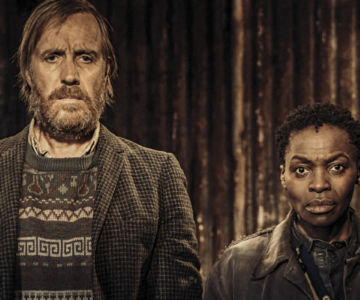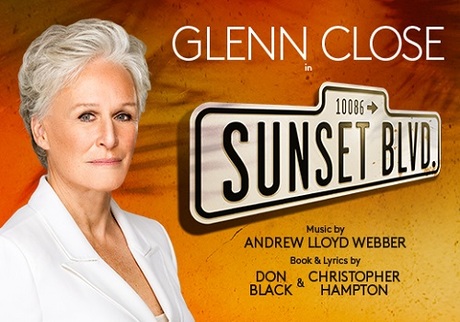 Mr Burns: A Clever Dystopian Tale So Close to Being Greatby Randi / July 1, 2021
Mr Burns: A Clever Dystopian Tale So Close to Being Greatby Randi / July 1, 2021The Dumb Waiter at the Old Vic: I Try Pinter Again!
It’s Theatre Thursday! Today’s show is the recent livestream of The Dumb Waiter from The Old Vic’s In Camera series.
Man, I feel like over the years I have seen every Pinter play (and piece of Mahler’s) and every time I’m like “…yeah okay.” Like I GET IT (do I?) he’s a genius and they’re all classics (really?) but it’s just…not my thing. The Dumb Waiter reinforced my whole ‘I mean sure’ vibe about Pinter.
The Dumb Waiter is widely considered one of Harry’s best shortypops, and I did appreciate that it was only about an hour long. The four-hander (that’s right) stars the very fine duo of Daniel Mays and Daniel Thewlis (who we enjoyed in Harry Potter and the Dude who Turns into a Werewolf) as two apparent hit men who wait in a prison cell-like room for instructions on their next target. I’m not the biggest fan of hit men, so at the start it’s an uphill battle for me to care about anything besides wondering if someone else in their universe could turn them in without using or glorifying the role of cops.
Instead of that, we had these two jackwagons sitting, reading the paper out loud, pacing, &c. And then they hear something in the wall and it’s a working dumbwaiter! Like for moving food between floors! Fun! Houses should have these! They start receiving messages – an envelope under the door, and then an order through the dumbwaiter. They’re like ‘well we don’t have any of these items’ so naturally they send back up whatever snacks they had on them. LIKE, WHY. I guess this humorous turn is kind of funny but the nonsense of it felt inconsistent. The men keep communicating with an unseen someone at the other end of the dumbwaiter, without really knowing who it is or what’s going on. Who is giving the instructions? Where are these messages coming from? These and more question will not be answered and will stand in for deep meaning!
I guess the whole twisty point of what, not knowing who you can trust? the destructiveness of power? everyone suffering under an unjust system? could have worth, but it had the emotional impact of a faux-motivational poster without supporting material helping any maxim feel earned. It kind of felt like Pinter trying to be Beckett. A loose plotline, slow pacing. a bit convoluted. As ever, I feel like Pinter plays are best appreciated by people who say ‘wow it really makes you think’ in a way that lets you know they have no idea what they are thinking.
Related Posts

On Bear Ridge: Sometimes Captivating, Often Confusing
This past weekend, the new play On Bear Ridge played its final performance at London’s Royal Court Theatre after a planned one-month run. Written by Ed Thomas and co-directed by him and Vicky Featherstone, On Bear Ridge was co-produced by National Theatre Wales and I believe was Wales-inspired, as it’s apparently a ‘semi-autobiographical’ work from Thomas about places we leave behind.
I’m talking a lot about background details and not the actual play because I have no idea what it was about.
Sure, I understood the general vibe it was going for, I think, of how forces greater than us can change our lives without our consent, maybe of what home is. I felt the fear of a violent, authoritarian government and all the chaotic terror it brings. The beginning of the play threw out an intensity that was often riveting, thanks to a powerful monologue from John Daniel, played by an actor I was thinking was an older, more grizzled version of Rhys Ifans, best known to me as Hugh Grant’s roommate in Notting Hill. I found out after the show that it was indeed Rhys Ifans, who apparently started growing the beard since that movie’s premiere in 1999. Not knowing anything about the play, I was moved by his passionate account of his wife’s difficult labor and his life on Bear Ridge, but the pull of this section didn’t last. Honestly, once his wife Noni (Rakie Ayola) appeared, their lack of chemistry to make me believe they lived their lives together or knew each other at all was a little distracting, even more so than when he and Hugh’s kooky sister were suddenly into each other.
So John Daniel and Noni (making me think of Bubble Guppies when I needed a break) are in their little butcher shop at the top of a mountain, in an area called Bear Ridge, an area that has long been abandoned by everyone else as an authoritarian regime destroys thinking and dissent and I guess electricity and mountains? I loved how the disappearing walls of their store and home reflected how they were losing everything and muddled the lines of what was real. I did not love why their slaughterman/adopted son sort, Ifan (Sion Daniel Young), who is living with them does a whole monologue about how much slaughtering suits him (vegan warning for future productions). When a soldier (Jason Hughes) comes to their door and threatens to shoot, the group somehow bonds? sometimes? Clearly driven mad by his traumatic experiences, the soldier careens between thinking of these new friends as friends and considering them the enemy. The stress of watching this powder keg of a man destined to explode was sometimes thrilling, but sometimes too stressful.
As the characters talked about their histories of trauma and what was going on with their society, it was…unclear what was going on with their society. Now, don’t get me wrong, I love a vague play, where the fuzziness is just fuzzy enough to allow it to speak to each audience member in a different way, to take away from it what they need. And this play accomplished that sometimes. What struck me was the hint of a fascist regime that had destroyed their home and killed their loved ones and continues to destroy any hint of dissent. But beyond that, what was really happening? How had they survived this long? What was real? Why is it 90% monologues when there are four characters onstage? And more than anything, why weren’t they leaving? Were they not able to, or was it all to stand their ground against a regime they couldn’t fight? I understand the latter, but the steadfastness of that sort of opposition wasn’t apparent. More ‘eh we live here’ than ‘THIS IS OUR HOME.’
Despite my ever increasing desire to stand up and shout ‘wait what is really happening just fill me in rill quick’, there were aspects I appreciated. Rhys, especially in the beginning, used his words and shouting and ENDLESS words in a interesting way that showed his compulsion to prove there was still a life force in him, especially in light of the talk of ‘the old language’. Ifan, on the other hand, seemed like a steady, more true-to-life character than him or anyone else on stage, and his realism was almost like a breather.
However, there was a lot of filler, which is hard to do for a 90 minute show. For example, I didn’t think the revelation about Ifan’s relationship with John Daniel’s and Noni’s son added anything. And of course I didn’t, like, love all the talk about slaughtering. (When Noni chimes in that they always did it humanely, it was impossible for me not to have the standard argument in my head about how there’s no such thing as humane meat BUT I DIGRESS.) (Also when John Daniel says “a dog may look up at you, a cat may look down at you, but a pig will look you right in the eye and you have to respect that” I couldn’t help but begin another argument beginning with THEN HOW COULD YOU KILL HIM? But I digress.) Due to the monologue heavy script, it was exhausting to watch, and felt longer than its run time. Usually when I am exhausted watching a play, I immediately go ‘I can’t imagine how hard it is for these actors to do this every day.’ And while that is true here, I think it may have been more exhausting for us to try to a) keep up with all the subtle hints at filling in the plot gaps and try to make order out of an anarchic tonne of information thrown at us, and b) stay on track listening to endless monologues. Towards the end, it felt like walls of text thrown at us, and while they were well done and well performed, too many of them at once is, indeed, exhausting, especially when you are desperate for a solid fact.
INFORMATION
The Royal Court Theatre is wonderfully located RIGHT next to the Sloane Square tube station, which is appreciated when it rains all the time. The building itself feels less well considered since the only bathrooms are downstairs on the far side of a big busy bar area and to get there you have to push through crowds of people enjoying the bar and not even there for the show which is like WHAT NO.
Also as usual London audiences laugh at the strangest, most disturbing moments, like when the soldier admits he just saw his commander commit suicide and he is falling apart and…they laugh, and not in a nervous way, in a ‘why are London audiences so freaking weird with what they consider funny’ way. BUT I DIGRESS.

“Sunset Boulevard” in London: Glenn Close is Amazing, That’s All That Matters
As you probably know from the movie and if you don’t you should go watch it, Norma Desmond used to be the biggest star in Hollywood, the most important and greatest face in silent films, but then she stopped having a 1 in front of her age and everyone was like bye Felicia, you gross and old, like not just for this movie, like for the earth. So she did what most celebrities do when they lose their status but still have lots of money – she became a recluse in her enormous, gaudy mansh on Sunset Boulevard (get it, that’s the title, and it’s where she lives), with only her creepy AF manservant Max tending to her day and night. When young screenwriter Joe Gillis lands at the house trying to flee from old-timey gangstas (fedoras, suits, and all), Norma is ecstatic that this handsome man can a) help her with her behemoth script for her comeback film ‘Salome’ (though she spits on the word comeback, hates it!) and b) be her kept boy for all kinds of gross things. Let’s talk about Joe for a minute. Joe sucks. Joe wears terrible pants but thinks he’s hot shit. He’s apparently behind on bills, and that’s why the gangstas are after him and his car, but like, are they so wrong? Does he really owe them money? What kind of business did he get himself into? What kind of man flees from his responsibilities and shacks up with a strange (both meanings) lady just because it’s super comfortable and he likes fancy things and doesn’t care about dignity? Such a weak-willed diddadoof. You’re like, who’s supposed to care that he gets shot? Me? Oh you’re serious? No. Oh, not a spoiler p.s., even if you haven’t seen the movie it’s not, because before a word of the play is spoken there is a body floating (hanging from wires) in the pool (over the very coolly lit orchestra pit), dressed in the clothes Joe is wearing. So you’re like, oh cool at least it ends well.
Glenn is in such control that she actually makes you understand Norma. Instead of playing her at full-tilt psycho like she easily could be, she vacillates between batty and harmless to delusional to dangerous and psychotic and all things in between with expert restraint. You easily see the changes that Joe’s company brings to her and in turn the changes she undergoes when threatened with his departure, so that at the end, when she is lost in her delusions (with her famous “I’m ready for my close-up” line) you are there with her, accepting her lunacy completely and not in a detached way that a lesser actress might leave you. She effectively shows that some roles are meant to be played by an actress that sings and not a singer who acts. Fully the former, Glenn’s acting is indeed beyond wonderful, but her singing is pretty wrecked. And this is actually so powerful that it seems impossible that the character could be performed any other way. Several years ago, when “Next to Normal” came out, reviewers said Alice Ripley’s raw and ragged vocal performance was like a razor’s edge that cut you to the core. (Alice Ripley has a fantastic voice; the raggedness was a mixture of acting choice and the role tearing her apart emotionally and physically. And it was spectacular.) Glenn’s voice here is like that but 100x more pronounced. It’s frayed and uneven and reminded me of woven baskets for unidentifiable reasons, but at times it is that same blade cutting through everything else. Somehow, oddly, her quieter, seemingly easier parts were where she faltered most, and then on the big numbers with huge belted high notes, she delivered on those! The exact opposite of what you would expect from a normal person. In a role like this, all of this totally worked because she is supposed to be very damaged but strong in her delusions. And, it showed that she was acting the songs above all, which is most important. Given that her two big numbers, “With One Look” and “As If We Never Said Goodbye” are also the most famous and most important songs of the show, it’s pretty wonderful that those are the ones she fully delivered on. No matter the reasons why they stood apart, as long as they did.
I am saying repeatedly that Glenn’s acting is what makes this show worth seeing (not that you can get tickets really; it’s sold out and ending in a month). That’s because it’s a crap show otherwise. This production is done exceedingly well, but it’s a crap show underneath. With music by Andrew Lloyd Webber and lyrics and book by people who aren’t peculiar billionaires, “Sunset” has 3 strong songs and then a WHOLE BUNCH of terrible, mind-numbing recitative repeated. You get the schmoozy “Let’s Have Lunch” at the beginning, which does establish the era and the schmooziness of makin’ pictures back then, but I don’t see how that demonstration is worth the sacrifice of art, enjoyment, pleasure, musicality, anything else. What about hooking the audience and building excitement? It’s just bleh. Who cares if it tells you what decade we’re in – costumes can do that better, and oh yeah, everyone seeing this already knows. This past week, my showtune rotation has been stuck on “Ragtime” and “In The Heights”, two great shows with impressive, blood-pumping, heart-racing openings. I love a good opening number. “Sunset” doesn’t have one, and so it becomes incredibly easy not to care about the story. And then immediately we go into “Every Movie’s A Circus”, which introduces us to Betty (a fine-voiced Siobhan Dillon) and the melody that will be repeated 1000000 times before the curtain falls. See, at first, you hear the melody of “Every (beat) movie’s a circus” and think, whatever, not exactly inspired music or lyrics but let’s move on to better things. But no, you never get to move on to better things because this melody is repeated for Every. Single. Book Scene. That and one other motif are repeated ad nauseam, and I mean nauseam. Someone decided that it would be a good idea if all the dialogue were sung to the same shitty melody over and over again, so much so that people (cough husband cough) were ready to cut off their ears if it meant being spared yet another tortuous go-round. Sometimes repeated recitative melody works, like for example in “Hamilton”, you get the melody from “Daddy said to be home by sundown” “Daddy doesn’t need to know” repeated several times throughout the show, as well as other core motifs. But they have purpose and meaning in their repetition, and they don’t beat you over the head with it so consistently that you want to beat your own head. It got physically painful to hear towards the end, when things are supposed to be dramatic and changing and you’re feeling the climax build and then like a sad clown coming back for a lame joke you get that same bullshit “every (beat) something’s a something” and it takes all your might not to F-ING SCREAM from the front of the dress circle to JUST STOP IT. 80% of this score is the stuff that gets played on the Sirius XM Broadway channel that makes my dad yell “Who do they think wants to listen to this schlock! Play the good stuff!” And sure, you could be arguing, ‘hey you even said there were 3 really strong songs and a few fine ones, so why complain about the recitative parts or say this isn’t a great show’ and I will answer because those repetitious sung book scenes were completely unnecessary, and unnecessary bullshit garbage makes me angry. There was no reason the book scenes couldn’t have been spoken instead of repeating the 2 motifs over and over beyond all semblance of purpose.
The opening of Act II, Joe’s big title number, is so much stronger than every other non-Glenn moment, thank goodness for that (although some of the lyrics are super cringe-worthy). Right before this number, to start the act, Joe emerges from the ‘pool’ in only a skimpy bathing suit, and someone in the balcony started applauding (he’s quite ripped) and then others joined in. It was hilarious. Joe is played by Michael Xavier, and he did a fine job with a terrible character. He really showed us Joe’s grappling with his own pitifulness and desperation and, by the end, self-loathing. Another very strong non-Glenn aspect was Fred Johanson as Max, Norma’s steadfast butler/servant/assistant and, we find out, former director and first husband. I feel like in the movie this latter revelation felt much more revelatory, but here it was stated and then completely glossed over, robbing it of all dramatic potential. Very odd. But great news, Johanson has a terrifically booming operatic voice and actually sang a non-annoying song very well. When we finally got to his solo number, husband actually sighed in relief and said at least someone up there can sing. No but seriously it was nice to hear. His voice in this cacophony of whatever was 100% in “Love Actually” when the little girls ask Hugh Grant to sing a carol and he starts singing “Old King Wenceslas” and then his driver joins in and has this enormous strong baritone and Hugh’s like whaaaat! That’s what Max is to this production. I mean, Glenn Close is still Hugh Grant and that’s why you’re watching, but it’s nice to hear a strong voice cut in.
Siobhan Dillon as Betty also has a beautiful voice, but by the time she gets to show off, it’s late in Act II and you’ve learned by now that Betty is a thankless character with no chemistry with Joe, and thank goodness for it, because as we established earlier, Joe sucks, and Betty has a good life ahead of her and is better off without him. So they have this big love-song duet that is supposed to be very emotional, but you feel absolutely zero anythings for them and just want them to stop so the story can get back on track.
But none of this matters because Glenn Close is giving a tour de force performance, a masterclass in acting, a role for the ages, and every other cliché you can think of. But it’s true. It was incredible to see her in such a defining role for the first time in so many years. All around, it’s just special. This production is staged more like a concert, extremely pared down with the sets just composed of dark industrial metal staircases going this way and that, a stray sofa or table brought in for various scenes, and an extravagant, almost ghastly Phantom-style chandelier coming down to represent the mansion. At first, I was upset not to get a garishly lavish set, but then I realized it was so much better this way, for two reasons: 1) No set could really live up to how extravagant the house is supposed to be; it would just be a underdeveloped attempt at showing it. This way, our imaginations more easily filled in the blanks. 2) The bare bones set let Glenn shine through even brighter. There were no distractions from her performance, and her performance is really all that matters here. Along with the rest of the audiences this month, I’m lucky to have seen her in this role.
AUDIENCE
Several phones lit up, especially from the big wigs in tuxes with buckets of champagne on ice in the private boxes. I mean, there is something about the entitlement of the upper class. Otherwise, the audience was extra attentive and extra vehement in its praise, with boisterous shouts of “Bravo!” from many members every time Glenn did something. It felt almost too much but she was great, so, there you go.
STAGE DOOR
It was a mess. The guards had no idea what they were doing and after 45 minutes realized that they had to move the enormous crowd to make room for Glenn’s car right up front. They need to set up much longer barricades and hire a guard that has any clue what to do. I waited an hour and then gave up; the crowd was too pushy to deal with. Other cast members came out but walked right away, assuming no one was waiting for them. An hour I would like back please.



